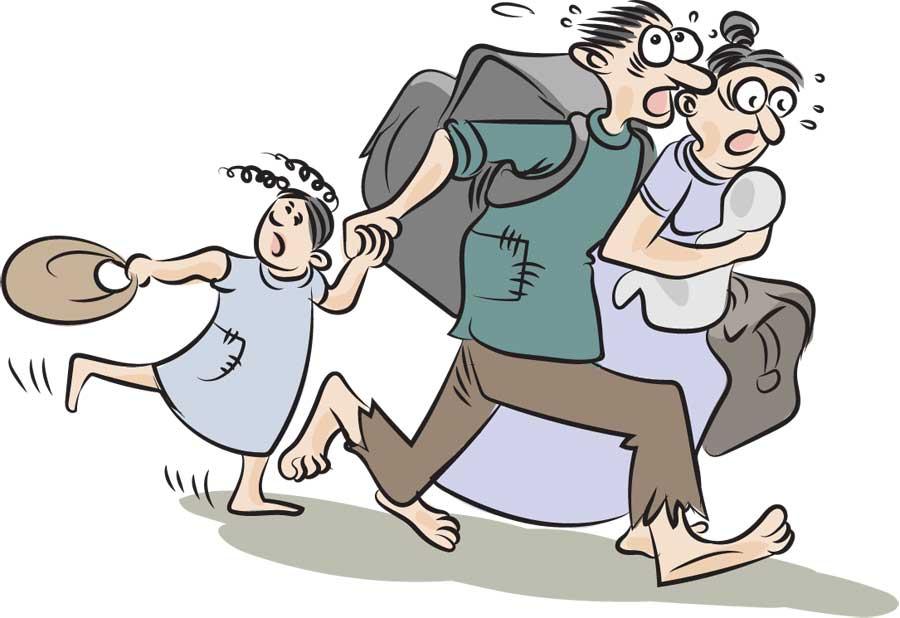Reply To:
Name - Reply Comment

Three days ago, on June 20, the world commemorated World Refugee Day. -that is people who have to leave their homes due to war or violence. Their fears are generally based on fears arising from race, religion, nationality, political opinion or membership in particular social groups. In most cases, they cannot return to their home or fear
doing so.
The United Nations High Commissioner for Refugees (UNHCR) points out that around two-thirds of all refugees world wide - other than the Palestinian refugees - come from just five countries namely Syria, Afghanistan, South Sudan, Myanmar and Somalia.
Palestinians, numbering more than 5.6 million are registered with the United Nations Relief and Works Agency (UNRWA) as refugees, forming probably the largest single body of refugees worldwide. Of this number, more than 1.5 million live in UNRWA run camps. The agency adds, the term “Palestine refugee” however, does not include internally displaced Palestinians.
Outside of Palestine, another over eighty two million plus unfortunate persons have been forced to abandon their livlihood, families and flee their countries of origin.
More than two thirds of all refugees under UNHCR’s mandate come from just five countries, namely the Syrian Arab Republic 6.7 million, Venezuela 4.0 million; Afghanistan 2.6 million; South Sudan 2.2 million and Myanmar 1.1 million.
Of this number at end 2020, an estimated 35 million (42%) of the 82.4 million forcibly displaced people were children below 18 years of age.
Between 2018 and 2020, an average of between 290,000 and 340,000 children were born into a refugee life per year.
Millions of people are forced to move from their homes every year to keep safe from war, persecution or natural disasters. According to United Nations (UN), every minute around 25 people have to leave everything in search of better and safer life.
In our own country, the word ‘refugee’ still sends shivers down the spines of many of our citizens. During the course of the ethnic conflict (1983 - 2009), more than 84,000 Tamils fled to neighbouring India. In addition, hundreds of thousands sought refuge in Europe and North America, becoming one of the western world’s largest groups of asylum seekers.
The conflict also displaced 800,000 Sri Lankan Tamils. Worse the insurgent group claiming to be ‘sole representatives of the Tamil people’-the Liberation Tigers of Tamil; Eelam (LTTE)- ethnically cleansed areas in the so-called Tamil Eelam occupied by members of both the Sinhala and Muslim communities. They were also reasons for the displacement of thousands of Sinhalese families living on lands bordering areas of the north and east of the country.
However, rather unfortunately, after the defeat of terrorism in the country, a few bigoted members of our society began attacking refugees temporarily housed by the UN in our country. Even sadder was the fact that attacking mobs were led by members of the clergy of a particular religious community.
This single act makes it all the more important to help create global awareness on the conditions and problems that refugees face in their lives. It also helps us understand the importance of the UN declared World Refugee Day.
It must also be stressed that though countries in the West and the US look askance at less developed countries, it is in fact the developing nations/countries who host 86% of the world’s refugees. History also shows it is the actions of the developed countries which have forced large sections of people to flee their lands.
One of the prime examples of this is the US adventure in Afghanistan. To date its military forage has forced over 2.6 million Afghans to flee their country. And despite the death, destruction and havoc, its indiscriminate bombing of civilian targets in that country caused, the US is still dilly dallying leaving that unfortunate region of the world.
The excuse, its concern for the Afghan population!